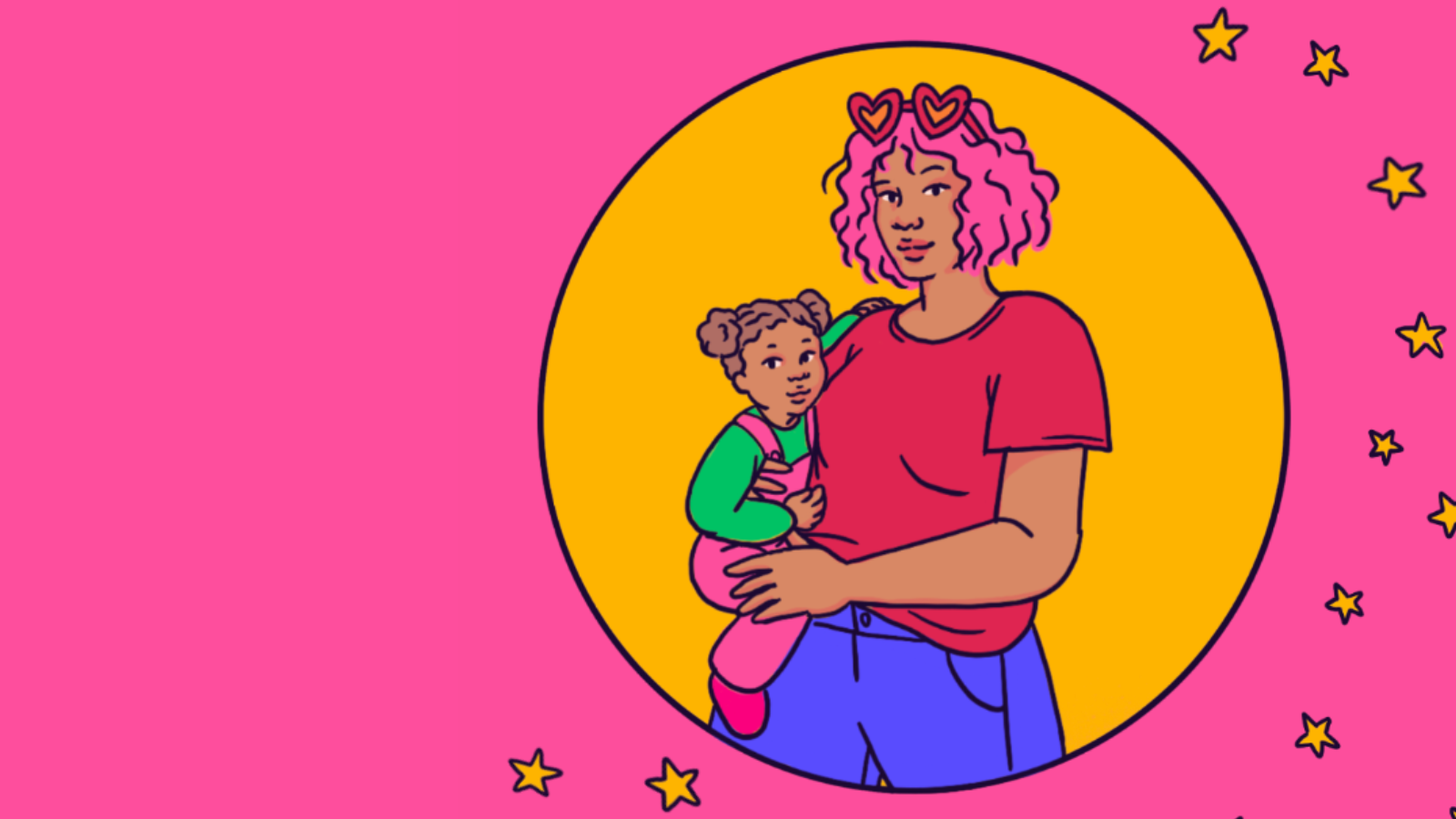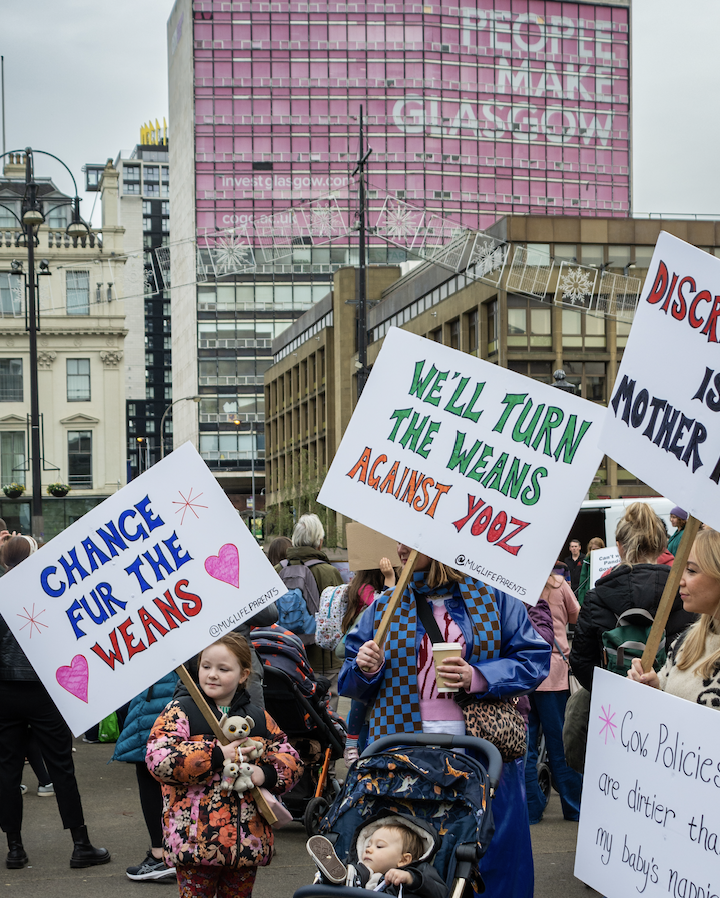“It’s not fair” is something you hear a lot as a parent. But for me, it took becoming a young mum, aged 25, to really know the meaning of the phrase. It’s certainly not fair that being a younger mum will have a negative impact on your earning potential for the rest of your life, but I worry this will be the case for me.
The Equality and Human Rights Commission are launching a campaign to raise awareness of how common pregnancy and maternity discrimination is towards young mothers. Unfortunately, young mothers bear the brunt of the harassment, victimisation and sackings. My experience, as a younger mum struggling to carve a career with two children in tow, feels like proof of this.
When I was fired, last year, from a role I’d worked hard to achieve, my confidence in myself and in the system hit an all time low. I lost my job, in part, I believe, because I’d asked for, and been granted flexitime, something which is protected under the EU law. But with less than a year’s service under my belt, I was unable to challenge the decision, when they said I just wasn’t up to the job as a communications consultant for a top independent marketing agency. The thing is, I can’t put my kids’ childhoods on hold while I build my career. But for a lot of it, I’ve felt unable to meet my employers expectations and also be a good mother.
I’ve spent many a school holiday juggling often dubious childcare, sometimes paying to go to work for the duration of the holiday in order to keep my career going. One year, I had a revolving group of students child minding my kids for little more than I was earning. I knew they smoked in my garden, sometimes turned up hungover and let me down once in a while, but I had no alternative – decent childcare is expensive and often hard to find. One of them overslept on the day I was made redundant from another role, as copywriter for a digital marketing agency. Here, I’d started aged 30, as an intern on minimum wage, because I had no digital experience, due to the fact the online world had changed so much in the years since finishing my journalism postgrad and having two children.
It’s standard practice for employers in popular industries to exploit young people and call it work experience. Young women often suffer the brunt of this, as internships, of which I’d already done several in my early twenties, eat into their fertile years.
As the summer holidays approached, with the attendant costs of wall-to-wall childcare, I put my foot down. “You want a copywriter?”, I said, “then pay for a copywriter. I have more than enough writing experience, and I can’t afford to work here otherwise.”
I demanded a salary appropriate to my age and was given it, but I felt my assertiveness came with a cost attached. Perhaps a degree of office inexperience showed, but there was nothing wrong with my writing skills – after all, I had a first class degree, and sub-editing experience gained on national papers and glossy magazines. But, when I started, as the only mother in a young organisation, I found it hard to keep up with the company’s “work hard, play hard” culture.
Here, leaving on time was frowned upon. Not joining in with after work activities, often involving copious amounts of booze, saw me sidelined, with the company CEO asking me aggressively why I had left a summer sports day event early. The fact I showed up for work early, often having battled tantrums, a night waking and breakfast on the floor before a five-mile cycle to save on tube fares, was never taken into account. The fact, exhausted by midday, I sometimes took a proper lunch hour, was verbally criticised. A succession of inexperienced, largely male managers saw one renege on an agreed “working from home” day on a whim after a minor technical hitch. Another ensured my workload became repetitive and arduous following an altercation over a day off when my son broke his collar bone, despite working through it, head in my laptop while my six-year-old was grey and silent with pain.
Sensing my growing anger and frustration, the company started to stage-manage my exit. Criticism was solicited from co-workers who had no idea about the daily challenges I faced. Thin allegations about my competency were brought and a disciplinary process began, as my mental health began to unravel to the extent I’d often be in tears at my desk. My doctor signed me off sick. We’d just moved house and I couldn’t afford to lose my job since my husband had himself suffered several redundancies during the financial crisis, and was on a salary two-thirds less than when we discovered I was pregnant, and took the decision to go ahead with the pregnancy.
I was eventually made redundant from that role, a week shy of two years service, the legal limit for bringing a case of wrongful dismissal, when I could have challenged the company for the bullying behaviour I’d experienced. Perhaps it was foolish to attempt to forge a career in a tough, young industry, given my situation – the ad agency world is known to be brutal. But at the time, I felt I had no alternative, with my “background” in b2b journalism, and despite a few bits of freelancing, I’d spent much of the previous five years pretty much just bringing up my children, my £19k graduate traineeship starting salary barely covering the childcare.
This traineeship I began six month’s pregnant, having worked as an intern in the holidays as part of a scholarship deal that had partially funded my postgraduate journalism qualification. My colleagues were aghast when I showed up with a bump. Though nothing much was said, I got the distinct impression they thought, who on earth did I think I was, at my pay grade, being pregnant? It simply wasn’t the way things were done. But for me, then aged 24, I felt more or less ready; biologically at my peak, a home-owner with a partner in an apparently stable, well-paid job, who was delighted to start a family. My pregnancy, which was easy and otherwise drama-free, happened almost without trying (which I wasn’t). And physically, I seemed to have a much easier time of it than others in my antenatal group who were, by and large, a decade my senior or older.
But then, choice is often a spurious word levelled at mothers, particularly young mums. It’s used as a weapon to blame women for the circumstances in which they find themselves having “taken the decision” to become pregnant. But it’s telling that a disproportionate number of women who give birth before the age of 25 have disrupted upbringings themselves. My pregnancy, though unplanned, offered me a chance to have my own family, an anchor that was missing in my own sometimes turbulent childhood. I longed to give my son the stability I had lacked as a child. But an unforgiving workplace didn’t always make this easy to achieve.
Despite being contracted as a trainee, and working as an editorial assistant over the course of a year, the fact I’d worked some of it unpaid meant I had to fight just to get statutory maternity leave. After my son was born, no one contacted me about returning to finish the traineeship. There was a tacit acknowledgement that it would be too hard for me to complete. In the end, I didn’t follow it up either, because childcare alone made it unaffordable – one of the single biggest challenges young mothers face. Instead, I started my own business, a home help service that offered cleaning and childcare in the local area. But as my son became a toddler and I became pregnant with our daughter, I was forced to wind it up before it had a chance to really take off.
It took my husband losing his job, shortly before I gave birth to our daughter, to kick me back into touch. I’d fretted about my career for years- it had never made financial sense for me to get a job. Now I had no choice, and so my fledging career as a copywriter was born.
But the employment precarity I’ve encountered since has made me really angry about how I was treated by organisations a young mum. In many cases, I simply couldn’t keep up with my child-free colleagues in an industry where presenteeism is rife. Now, aged 35, with many of my friends and ex-colleagues having babies themselves, it’s telling that my gut reaction is “so, now you might understand.”
But I’m also frustrated by a working culture in which women are all too often funnelled down a narrow career path that offers only a small window after building and accruing job security to have children before their fertility falls off the proverbial cliff. For those, like me, who go off- piste, and who aren’t in their jobs long enough to garner better protection from unfair dismissal, it’s all too easy just to give us the push in a challenging economy when belts get tightened.
In my last workplace, it was telling there was a raft of redundancies around the time I was sacked. For women up against the ebbing sands of their fertility clock, it means the timing of a pregnancy can be crucial to the level of support they receive from their employers. And unfortunately women’s fertility doesn’t always go according to schedule.
A six-month hiatus from work followed in which I gathered my resources – I was, by then, bone-tired from a decade of stress from working motherhood – and considered my options. I looked into teaching as a way of managing the next decade or so’s school holidays and to try and achieve better job security. In the end, though, I can’t justify the drop in salary to one not much more than that I started on as a qualified postgraduate.
Next month, I hope to start a new job, timed to enable me to return after half term, though the summer holidays loom once again. I was offered the job after two interviews and five capability tests. But when the recruiter mentioned flexibility to HR (I didn’t ask her to, but she assumed I’d need it after a conversation in which I mentioned concerns about juggling the holidays), it’s gone a bit quiet, and I’m still hoping they haven’t changed their minds.
It’s this kind of paranoia that makes speaking out against under-the-radar workplace unfairness so dangerous in an employment market where people feel increasingly disposable. I hope my new employer will be more understanding of my situation, though now my children are older it is less of a day-to-day challenge. But I feel so passionately about the discrimination inherent against young mums in the workplace, I feel it’s important to raise awareness of the issues we face.
From a personal perspective, speaking out for this campaign makes me feel my efforts have not been in vain. It means I can stand up amid my peers from journalism school – many of whom, tellingly, do not yet have children, and went on to be editors on glossy magazines, well-known columnists, travel writers or TV presenters – and not feel ashamed about my career trajectory. I only hope my children can one day feel as proud of me as I am of them.
It has been tough, but young motherhood is not necessarily something to be frowned upon, offering cost savings to society through better maternal (and possibly foetal) health, if women are able to take advantage of better opportunities before and after their children are born. At the very least I can say that I became a mother when I was relatively cheap. For my friends having children now, the question is not so much if can they afford to work, with children in tow, but if they can afford to take time off. It begs the question whether policies affecting working mums should be left to employers to quibble over. Rather, better employment protection should be granted as an inexorable human right, levelling the playing field so women can make better choices about when the time is right for them to become parents, rather than when, if ever, it’s right for their employers.
Reprobate Mum blogs at www.reprobatemum.com, and has written for the Huffington Post, The Sunday Times Magazine, Marie Claire and mumsnet.com. Her book, How to Be A Reprobate Mum, is represented by Jacaranda.


